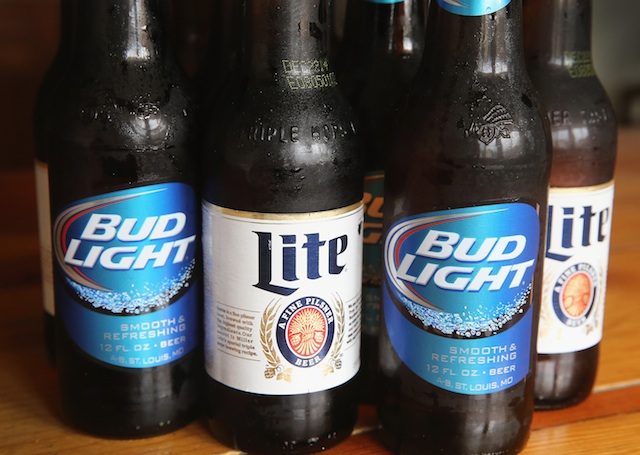The World's Two Biggest Beer Makers Could Merge
By Emma G. Gallegos in Food on Sep 16, 2015 5:32PM

Bottles of Miller Lite and Bud Light beer: together at last? (Photo Illustration by Scott Olson/Getty Images)
The world's largest beer company says it plans to make an offer to take over the world's second largest beer company. That means that one really big beer company could be making one out of every three beers in the world—if regulators around the world allow it.
Anheuser-Busch InBev has approached its rival SABMiller about a merger, Reuters reports. Both companies acknowledged the proposal, though they haven't offered any specifics. The Financial Times has a chart that shows you just how big a deal this would be:
A combined SAB-AB Inbev would be responsible for one out of three beers produced worldwide: http://t.co/zvQgb5n7O0 pic.twitter.com/Hc21iw71YB
— Financial Times (@FT) September 16, 2015Fortune has a very long list of the beers owned by each manufacturer. Anheuser-Busch InBev is based in Belgium, and it's the manufacturer behind Budweiser, Stella Artois, Corona, Beck’s, Michelob Ultra, Modelo Especial, Goose Island, Rolling Rock, and so, so many more. SABMiller, based out of Britain, brews Miller, Grolsch, Pilsner Urquell, Blue Moon, Foster’s, Milwaukee’s Best, Peroni and, again, so many more. Quartz has a handy beer tree that shows the ancestry of each of the Big Beer Manufacturers around the world.
Altogether, a merged group would be worth $275 billion, and stocks in both companies rose with the news. The big draw for AB InBev is SABMiller's strong presence in Africa along with their breweries in Asia. AB InBev already has the Latin America market locked down, Reuters says. This merger is likely largely about growing markets outside of the US, but The Atlantic notes that this would mean the same company owns two iconic American Big Beer brands: Miller and Bud.
You better believe regulators will be watching this deal closely, particularly in the U.S. Crain's says that the two brewers control roughly 70 percent of the U.S. beer market.
"Antitrust regulators in every country where the two companies are in the top three will question a merger," Erik Gordon, professor at the University of Michigan's Ross School of Business, told Reuters. "The costs that could be saved in the distribution operations are high - and the antitrust hurdles are higher."
Crain's says that a likely outcome of the merger—if it goes through—would be the break-up of the Chicago-based MillerCoors, which is a joint venture of SABMiller and Molson Coors. The venture has more than 8,000 employees. MillerCools hasn't commented on the proposal.
Consolidation has been the big trend in beer lately, and even smaller brands, like the aforementioned Goose Island have been snapped up by bigger companies. And recently, Heineken acquired a 50 percent stake in craft brewer Lagunitas.